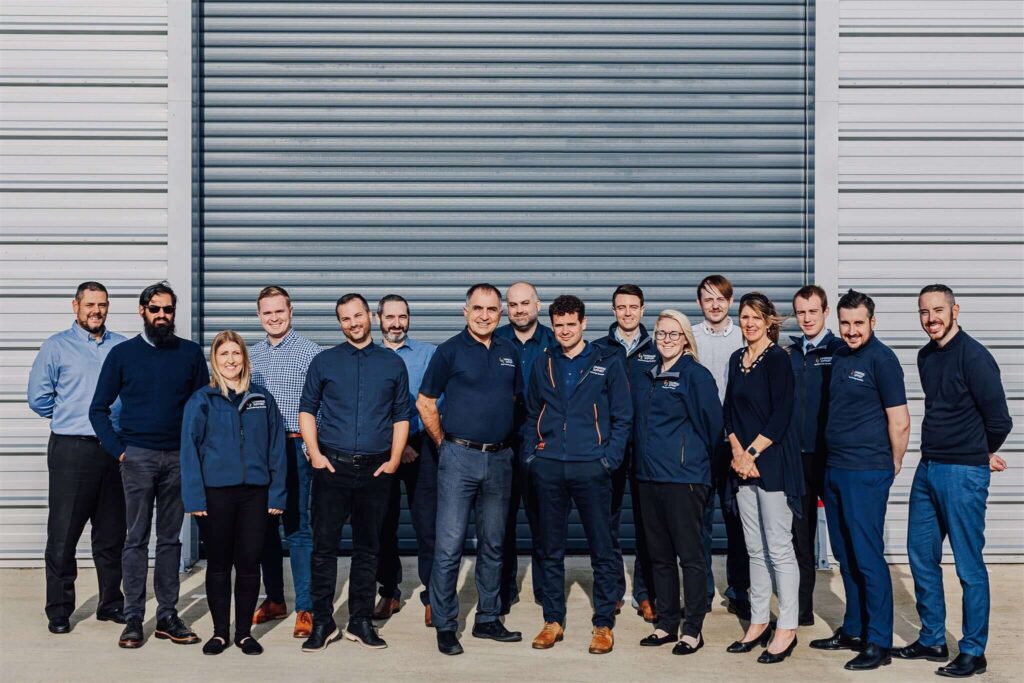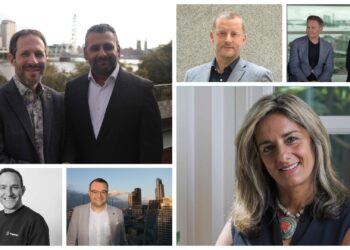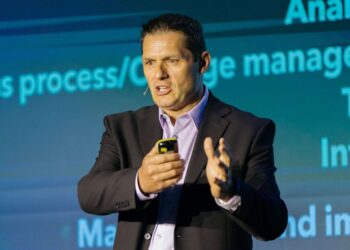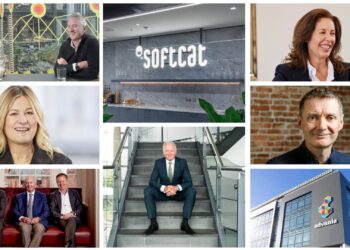The release of the recent Oxygen Fast-Growth 50 served up five fascinating trends on where the market is heading.
Compiled in association with Giacom, the report highlighted 50 high-growth MSPs, MSSPs, resellers, IT consultancies and IT solutions providers.
But what trends can be gleaned from observing the Fast-Growth 50 – and the wider 527 channel partners with over 15 staff from which they were drawn – as a collective?
1. Fast-Growth 50 firms buck the slowdown
2023 and 2024 represented something of a tech recession, with global IT spend growth slowing to 3.3% and 7.2% across the two years, according to Gartner.
That was mirrored in IT Channel Oxygen’s recent Oxygen 250 2025 report, which charted the fortunes of the UK’s largest tech partners with revenues ranging from £2.5bn down to £16m.
Their revenue growth slowed to 12.6% in their most recent years on record, down from 17.8%.
The 527 firms from which the Fast-Growth 50 were drawn represent the next layer below Oxygen 250 by size (being either too small to feature in it, or at least to report full accounts with a revenue number).
So did headcount expansion slow among these smaller partners?
The answer is yes, although only negligibly.
Combined average monthly headcount of these 527 tech partners rose 7.5% to 20,658 in their latest years on record (which were typically for the periods covering either the 12 months to 31 December 2023 or 31 March 2024).
That’s down from the 9.3% and 8.3% headcount rises they recorded in the two previous years.
To put it another way, they employed an average of 38.5 staff in their latest years, up from 35.8, 32.8 and 30.3 in the three previous years.

But if there was a market slowdown, noone told the 50 firms who made the cut for the report.
They employed a combined 2,887 staff in their latest years on record, up 36% on the 2,126 staff they employed a year previously and 152% on the 1,144 they employed two years before that.
“Our target is to double [sales] each year, year on year. We think that’s pretty ambitious in the current economic climate and also without a load of M&A,” Jason Osmond, CEO of top-ranked Forge Technologies said.
2. …But AI could curb future job creation
The rise of AI has been touted as an opportunity for MSPs to increase efficiencies and save time.
But what does that mean for hiring and headcount expansion rates among Fast-Growth 50 firms?
In at least some cases, MSPs and resellers who have spent recent years furiously adding headcount are now looking more towards AI, and less towards people, to fuel their future growth.
“I don’t think we’ll see such fast headcount growth [in 2025],” said Rob May, Executive Chairman of 38th-ranked ramsac, a Guildford-based IT consultancy that has organically grown employee numbers from 65 to 120 over the last four years.
“That shouldn’t be necessary. The reality of what we’re selling as an industry should mean we’re able to do more with the same number of people.”

Stephen Richardson, CEO of 31st-ranked Digital Origin, agreed, saying that the Northampton-based MSP’s ambitious expansion plans will be underpinned mainly by greater use of AI, rather than continued headcount expansion.
“We’ve mapped out that five-year plan, and actually, our service desk doesn’t get much bigger,” he said.
“It will support three times the size of business with the same amount of people because of that AI piece that will come into it.”
Sean Houghton, Co-founder of 42nd-ranked Fast-Growth 50 outfit Aztech, named AI-driven automation in IT support and security as his biggest growth bet for 2025, meanwhile.
3. AI cursed and blessed in equal measure
When it comes to the tech and services they actually sell to customers, AI is something of a curate’s egg for the 50 firms in the report.
Many picked out AI as their growth bet for the year ahead, while simultaneously rebuking it for being their biggest tech let down of the last 12 months.
Some felt their customers are trying to run before they can walk on AI.

Emma Henry, Co-founder of 14th-ranked Inform Team, dubbed it the ‘AI illusion’.
“Organisations have invested heavily, expecting instant impact, but AI isn’t just a switch you turn on,” she said.
“Rushed AI adoption without standards like ISO 42001 has led to unreliable systems, security risks, and ethical concerns, undermining trust and sustainability,” added Diptesh Patel, CEO of second-ranked outfit, UBDS Group.
Others were more frustrated by the rise of “AI-washing”.
“We often see the term used in discussions, sales material, and demos, only to find that it is beyond artificial and not very intelligent,” said Neil Taylor, MD of 19th-ranked Opticore IT.
But when it got down to brass tacks, most of those we asked saw AI as their biggest growth opportunity for the year ahead.
“Our biggest growth opportunity for 2025 is in the AI space, particularly with agents and Microsoft Copilot Studio,” said Stuart Goldwater, MD of 40th-ranked Pragmatiq.
David Kress, COO of 7th-ranked Datatonic agreed, adding that he felt that accelerating adoption of AI will mean “the era of the proof of concept is over”.
Customers are instead “moving use cases into production quickly”, which “will provide [them] with a significant advantage over their slower-moving competitors,” he said.
4. Fast-Growth 50 performs services switch
Are we nearing the end of traditional resell?
That was the provocative title of a recent LinkedIn blog post by Canalys Chief Analyst Jay McBain, who noted that the proportion of global IT spend travelling through the channel dropped from 73.2% to 70.1% last year.
He noted that the rise of cloud and AI had reduced the opportunity for traditional resell. SaaS vendors and hyperscalers are rewarding their partners on “multipliers” around design, migration, implementation, integration and managed services, while hardware vendors are “pushing hard” on recurring revenue models, McBain explained.
This trend is reflected in the make-up of this year’s Fast-Growth 50.
Only a small handful would describe themselves as resellers or VARs. This includes Highgate, which has spent recent months building a partner-led services proposition.

Nine have a laser focus on providing consultancy or managed services around Microsoft technologies (including four Microsoft Dynamics specialists), while eight are cyber security specialists or MSSPs. Others, including ServiceNow partner Flyform, Google specialist Datatonic, dedicated AWS partner CloudBridge, Oracle NetSuite ace NoBlue2 and Cisco Webex ally Original, offer consultancy around a specific vendor.
Some, including 3rd-ranked Croft and 31st-ranked Digital Origin, are on a mission to consolidate mobile, comms and connectivity with IT, meanwhile.
The remainder are more generalist IT MSPs, consultancies and solutions providers, many of which now have a heavy emphasis on services and recurring revenues.
This includes the report’s top-ranked outfit Forge Technologies, which has grown from zero to 41 staff in four years with a services-first approach (some 70% of its revenues are annuity based).
5. ESG not incompatible with growth
Although sustainable transformation is often dismissed as a cost, some of the firms in the report are proving that growth and good ethics can go hand in hand.
An unusually high proportion – three out of 50 (or 6%) – are certified B Corps who have demonstrated their commitment to balancing profit with purpose.
“It’s a good way to prove companies can do good as well as do well,” Diptesh Patel, the CEO of second-ranked UBDS Group said of its 14-month journey to become a B Corp, which it secured in October 2024.

One Fast-Growth 50 firm – Cambridge Support – recently became employee-owned while at least three (Shaping Cloud, Inform Team and Chorus) are female-led.
Despite some backsliding by US-based vendors, the Fast-Growth 50 is proving that the ESG and DEI agenda is alive and well in the UK channel.













